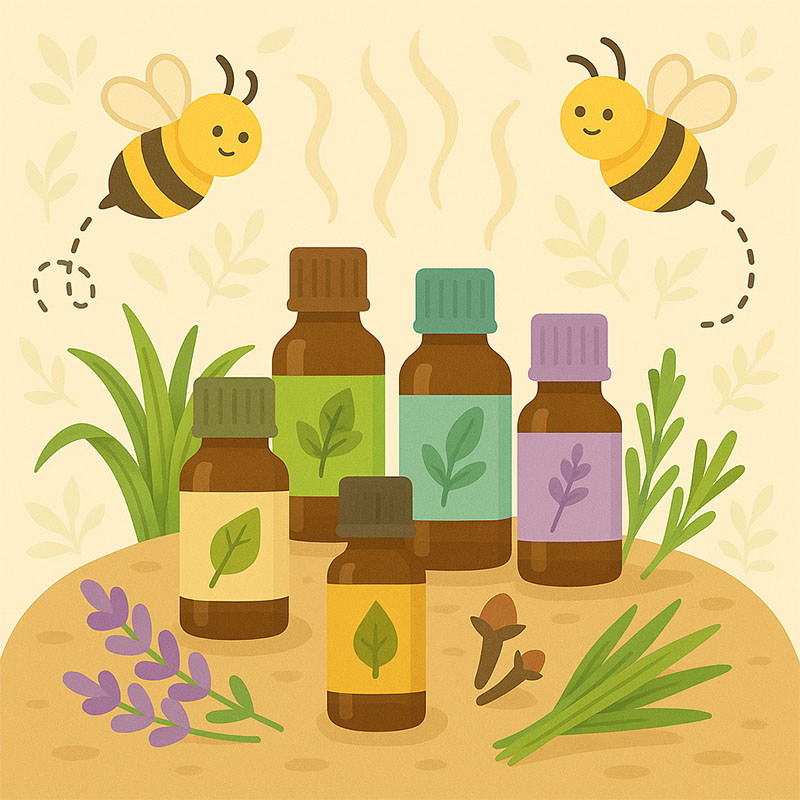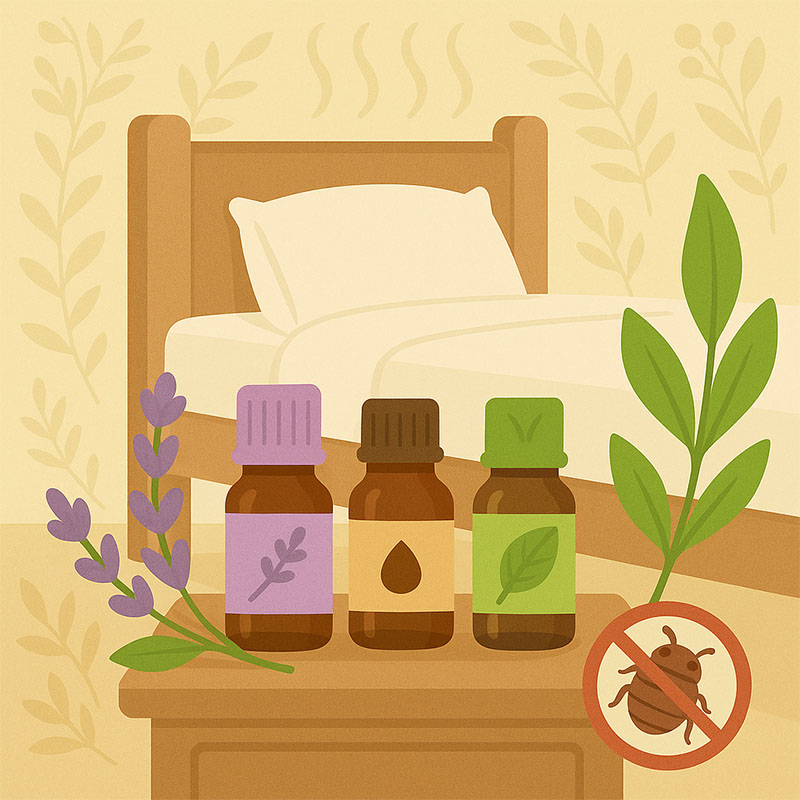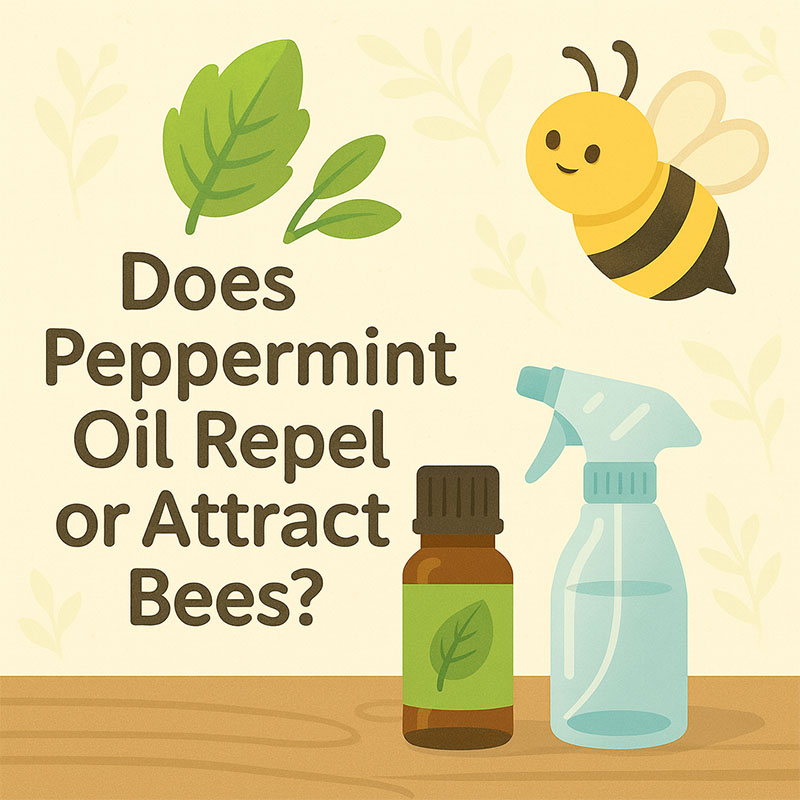I love bees for the role they play in pollination, but I’ll admit—there are times when I’d prefer they keep a respectful distance from my deck, patio, or front door. The challenge is finding a way to discourage them without using harsh chemicals that could harm them.
Through my research, I’ve found that essential oils can be one of the best solutions: they’re safe, natural, and eco-friendly when used correctly.
Why I Prefer Essential Oils Over Chemicals
Chemical pesticides might work, but they come with a big downside: they can harm pollinators and other beneficial insects. Essential oils, on the other hand, are much gentler. Studies suggest many of them pose no acute lethal effects on bees when used properly, making them a bee-safe alternative to harsher repellents.
If you’re more interested in how bees respond specifically to peppermint oil, I’ve covered that in detail here.
How Essential Oils Affect Bees
Bees rely on their sense of smell for everything—navigation, foraging, even communication. Certain compounds in essential oils can disrupt those signals or mimic pheromones. Oils rich in citral, limonene, and geraniol (like citronella and lemongrass) have been shown to repel insects effectively.
The Essential Oils I Found Most Effective
Here are the oils that came up again and again in my research as effective bee deterrents:
- Citronella Oil – A registered biopesticide since 1948. It contains citronellal and geraniol—compounds bees avoid (Wikipedia).
- Clove Oil – Its spicy, pungent scent discourages bees. Some beekeepers even use diluted clove oil on gear to reduce bee aggression (Reddit).
- Eucalyptus Oil – Its sharp scent can deter bees and other insects outdoors.
- Lavender Oil – Live plants attract bees, but lavender oil or dried sachets near doors can discourage them.
- Lemongrass Oil – High in citral and geraniol, making it an effective deterrent (Moksha Lifestyle Products).
- Tea Tree Oil – Known for antiseptic qualities, its strong aroma can also help keep bees at a distance.
For a deeper dive into how citrus oils specifically repel carpenter bees, check out my DIY citrus spray guide.
Clearing Up the Peppermint Oil Myth
One thing I kept running into was the claim that peppermint oil repels bees. After digging deeper, I learned the opposite is true. Beekeepers report that peppermint (and similar oils) often attract bees. In fact, products like Honey-B-Healthy use mint oils to draw bees to feeders.
If you’d like to see the full breakdown of the science and beekeeper experiments, I’ve written a dedicated guide on peppermint oil and bees here.
DIY Bee-Repellent Recipes
Here are a few simple ways I’ve seen essential oils used safely and effectively:
| Use Case | Ingredients | Instructions |
|---|---|---|
| Outdoor Spray | 10 drops of citronella or clove oil + water + 1 tsp carrier (optional) | Shake bottle and spray around patios or doors. Reapply after rain. |
| Entryway Sachets | Cotton balls soaked in eucalyptus or lavender oil | Place near windows or doors. Refresh weekly. |
| Garden Candle | Melted wax + citronella oil | Pour into container and burn during outdoor gatherings. |
If carpenter bees are your biggest concern, I also have a full step-by-step guide on natural ways to repel carpenter bees.
Safety Tips I Always Keep in Mind
- Dilution matters – A few drops per ounce of water or carrier oil is plenty.
- Avoid spraying blooms – Bees need flowers; oils shouldn’t interfere with foraging.
- Test for sensitivities – Indoors, I start small to avoid irritation.
- Reapply often – Oils evaporate quickly, so I refresh after rain or wind.
FAQs
Does peppermint oil repel bees?
No—studies and beekeepers agree it often attracts them. I explained this more in my full peppermint oil & bees guide.
Are essential oils safe for pets and kids?
Yes, if properly diluted and used with care.
Can essential oils kill bees?
Not at normal use levels. Research shows they’re non-toxic in practical amounts, though overly concentrated applications may cause stress (PMC).
Recommended Oils
👉 Here are two solid picks if you’d like to try this yourself:
- Organic Citronella Essential Oil – An EPA-registered natural repellent that’s perfect for sprays or candles.
- Clove Bud Essential Oil – A strong, spicy oil bees dislike, great for sachets and outdoor sprays.
My Takeaway
Essential oils like citronella, clove, eucalyptus, lavender, lemongrass, and tea tree can give you a natural, bee-friendly way to create space between you and buzzing visitors. With the right dilution and a little care, you can enjoy your patio or garden comfortably—without putting pollinators at risk.
And if you’re interested in digging deeper, you can explore my related guides on:




